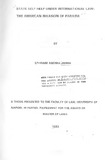| dc.description.abstract | In December 1989, a contingent of American Navy, Airforce and Marine Commandos numbering 24,000 invaded the tiny Central American Republic of Panama and in a matter of few hours knocked out the superficial resistance offered by the Panamanian forces, General Antonio Manuel Noriega, who sought refuge in the Vatican Embassy in Panama, was persuaded to giye himself up to United States authorities after a two week negotiation period,
flown to the United States, was charqed with money launderlnq, racketeering and drug trafficking. He was convicted and is currently serving a life sentence.
A few' hours' before the American invasion, Guillermo Endera, who was considered to have won a landslide victory in the, presidential elections, was sworn into office by a Panamanian judge in an American base in Panama. The invasion drew widespread praise in Panama and the United States, but the rest of the international community, with the exception of Great Britain, was unanimous in its condemnation.
The action of the United States is unprecedented In international law. Admittedly the United States, armed with the Munroe doctrine and the so called, 'Gunboat diplomacy', intervened with impunity, in what is now traditio,nally considered the Third World in the second half of the 19t1l. century and the early years of the zov century. However, the charter of the United
Nations and of the Organization of Ametican States, (of which both Panama and the United States are members), coupled with numerous resolution of both the Security Council and the General Assembly and the practice of states since 1945, leave no uncertainty as to the intent of international law regarding the use of force; that states are only allowed to resort to force in self defense. Against this benchmark of the overwhelming evidence of international law, how
could the American invasion be justified?
The United States State Department provided four justifications for the
American invasion of Panama;
i. To protect American lives in Panama
ii. T? restore democracy
iii. To combat drug trafficking
iv. To protect the integrity of the Panama Canal.
The first chapter of this thesis will explore the evolvement of the law regulating the use of force from the so called 'Model of Westphalia' to the present and the accompanying state practice. The second chapter will be a detailed investigation of the legality of the 4 justifications provided by the State Department for the invasion of Panama. The last chapter will inquire into the
implication of this invasion for the future of international law, new trends and developments of the practice and attitudes of state regarding state setfhelp and the role that can he played by the super powers and the United Nations in discouraging state self help and encoutaging the rule and efficacy of t'' international law in the post Cold War era. | en_US |

